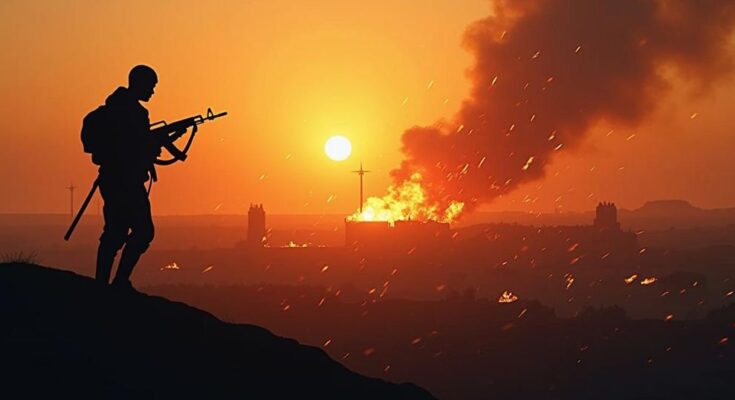Israel’s military offensive on Lebanon heightens following the death of Hezbollah leader Hassan Nasrallah in an airstrike, with casualties rising above 1,000. International leaders express concern over the humanitarian crisis, while Iran pledges to avenge Nasrallah’s death. UN calls for immediate de-escalation amid ongoing attacks from both sides.
The ongoing conflict in the Middle East has escalated significantly as Israel intensifies its bombardment of Lebanon following the confirmed death of Hezbollah leader Hassan Nasrallah in a recent airstrike in Beirut. The Israeli military asserts that it has targeted numerous Hezbollah locations, claiming that hundreds have perished in these assaults over the past week, including numerous civilians, among them children. These strikes have devastated heavily populated areas of Beirut, leading to widespread devastation and displacement. The Iranian government has vowed to retaliate against Nasrallah’s killing, a sentiment echoed by various global leaders who condemn Israel’s military actions. The humanitarian toll continues to rise, with reports indicating over 1,000 fatalities and approximately one million people displaced. The situation remains dire, and international reactions, including calls for cessation of violence, grow increasingly urgent as tensions rebound amid a wave of retaliatory strikes from Hezbollah. As the Lebanese government prepares for three days of official mourning for Nasrallah, Hezbollah has yet to announce funeral plans. Iran’s Islamic Revolutionary Guard Corps confirmed the loss of one of its senior operatives alongside Nasrallah, further complicating the geopolitical landscape. The international community, including the United Nations and foreign governments, has expressed serious concerns regarding the implications of this conflict, underscoring the need for de-escalation and renewed dialogue.
The current hostilities are part of a long-standing conflict involving Israel and Hezbollah, a Lebanese militant group backed by Iran. Recent escalations have culminated in massive military engagements, resulting in significant loss of life and humanitarian crises. The assassination of Hassan Nasrallah, a pivotal figure in Hezbollah and regional resistance movements, marks a critical turning point amid already fraught tensions. Prior to this incident, there has been a tendency for cycles of violence to intensify quickly, often due to retaliatory actions from involved parties, exacerbating the humanitarian situation within Lebanon and the broader Middle East.
This violent episode underscores the complexities of regional geopolitics, where shifts in leadership and military capabilities can drastically alter the landscape. With Iran’s call for retaliation and the United States reaffirming its support for Israel, the potential for further escalation looms large. International diplomatic efforts will be crucial in seeking a path toward stability and resolving the underlying tensions that continue to fuel this conflict.
Original Source: www.theguardian.com




